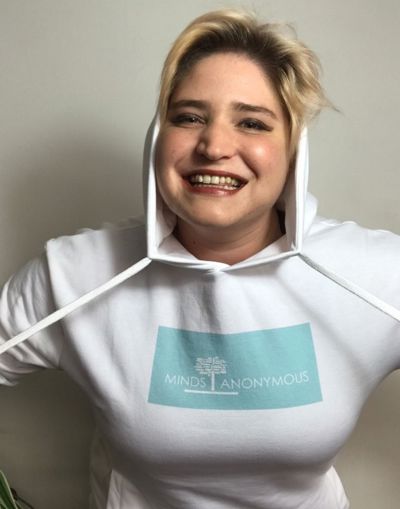‘Stop, drop and roll’: Schizoaffective disorder – Louisa’s story
09/05/2022
Louisa experienced hallucinations as a child. She was diagnosed with acute psychosis at 18 and schizoaffective disorder at 27. Despite having low days, she has learnt to enjoy the days she excels, and is loving life.
I went to a festival and ‘bang!’ Something in my brain snapped and my reality changed, my senses warping my experience of the festival from a fun-filled place of friends and music to a dark place full of monsters. I wanted out. I wanted to die. And I nearly got my wish from starvation and dehydration - in my case, when I experience psychotic episodes, drinking water, showering, daily care tasks really don’t get much air-time.
I had been becoming progressively unwell for months, with feelings of grandeur in my highs and thoughts I was the devil in my lows. I had struggled with depression for years but the manic highs and thoughts I was not real, not a human being, were relatively new.
I began self-harming around the age of 10 and depression was queried in my teens. I can remember experiencing hallucinations as a child but, for me, the hallucinations were so real it was hard to identify them from reality, so they went unnoticed. The diagnosis after the ‘bang!’ at age 18 was acute psychosis. It wasn’t until age 27 that I was diagnosed with schizoaffective disorder.
-
Exercise, seeking professional help (The Early Intervention in Psychosis Team were incredible), and studying my degree were all paramount in my recovery. Setting myself goals and small daily tasks gave me purpose.
My father took his own life the week I was detained under the Mental Health Act after my second acute psychosis in 2009 (a year after the ‘bang!’). I saw the effect suicide has on the living and, as I look back, I feel like his death sparked something in me. A thirst to get well. I had to make life work. To do that I had to develop some self-worth.
It’s not easy living with schizoaffective disorder. Financially it’s difficult because the side effects of my medication mean I don’t have the physical health to work full-time. I am often very energetic in the mornings so I can be extremely productive early in the day and that makes up for the odd day when I can’t work at all. When I get an occasional low day, I've taught myself to rationalise that the feeling (or lack thereof) is a temporary state. I can’t stop the lows, I can’t control the depression and when the world is black there is no climbing out of the hole. The only thing to do is ‘Stop, Drop and Roll’ which I discuss in my website mindsanonymous.com. I have learnt to forgive myself for these days and enjoy the days I excel.
If you are reading this, and it resonates, I hope the fact that I’m now happy and loving being alive gives you hope that this illness doesn’t have to mean a lifetime of misery. I recommend you learn about your triggers and work with a good professional to get you on the right treatment and lifestyle plan. Exercise, eat healthily, sleep, and pay attention to what lights up your soul. I wish you mental wealth.
In 2021 Louisa was a Rethink Mental Illness Janey Antoniou Awards finalist.

